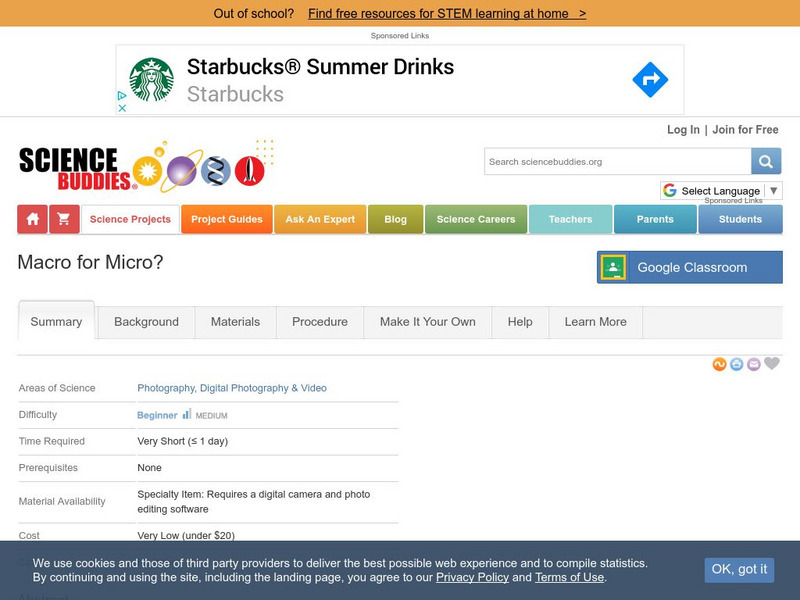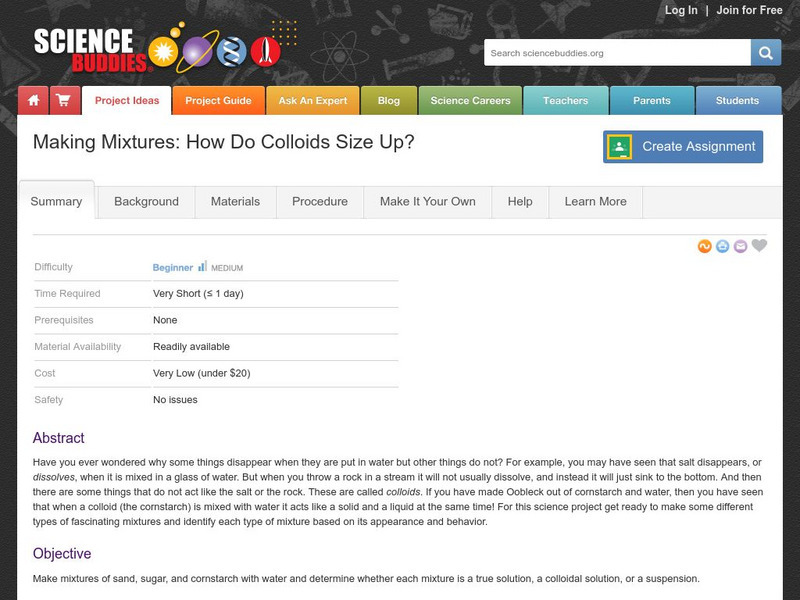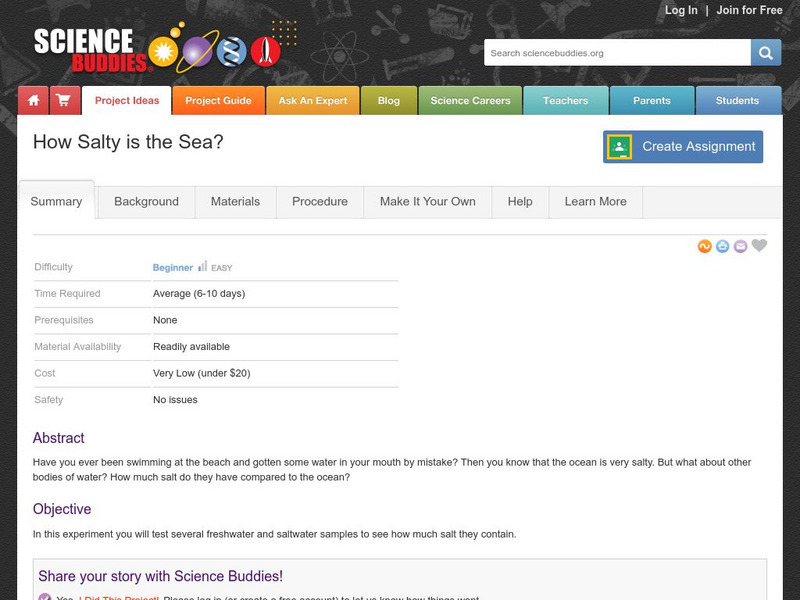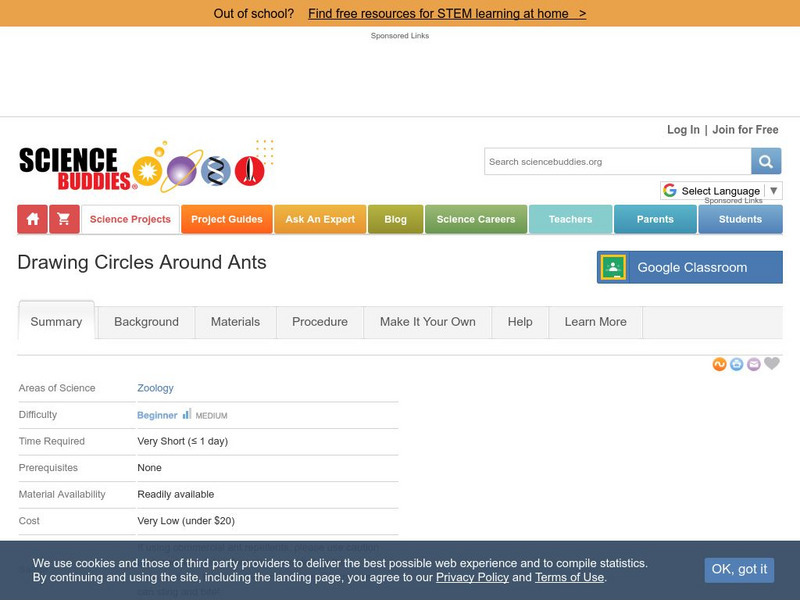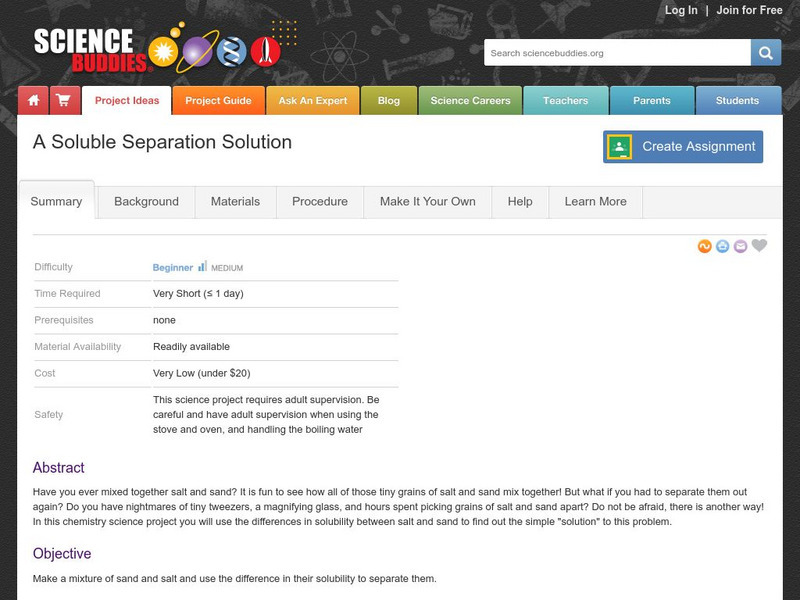Science Buddies
Science Buddies: Color Saturation
Lively, vivid colors can add pizzazz and turn a dull photo into a work of art. Learn how changing the saturation levels of the colors in your photo can really make it pop.
Science Buddies
Science Buddies: Keeping Up
Do you ever feel like you need to walk faster than your parents just to keep up with them? This is because of the difference in leg length between you and your parents. In this experiment you will test if the height of a person is...
Science Buddies
Science Buddies: Digital Photo Contrast
What do you do if you take a photo and it turns out too dark or too bright? You can use your computer to fix it for you. In this experiment you will investigate how changing the contrast of a digital photo will change the colors and...
Science Buddies
Science Buddies: Color Profiles
Did you know that the same digital photo you see on a computer monitor may not look as good in print? When it comes to color profiles, there are a lot of options: RGB, CMYK, grayscale and indexed color are just a few. Learn how to choose...
Science Buddies
Science Buddies: Bit Depth, Colors and Digital Photos
How many bits of information are in a digital photo? It depends on how many possible colors there are. Learn how to choose the right number of colors and bits to post your photo on the web or send it to your best friend.
Science Buddies
Science Buddies: Pinholes, Light and Aperture Size
Pinhole cameras are not a thing of the past. Even compared to all of the latest technology, a pinhole camera still gets beautiful results. Find out how this very simple aperture design works to control the way light enters the lens of...
Science Buddies
Science Buddies: Macro for Micro?
If the prefix "macro" means large and "micro" means small, then why will the macro setting of a digital camera help take a better picture of a small object? Do this experiment and get the big picture.
Science Buddies
Science Buddies: Yogurt Cultures
Find out in this experiment how good bacteria can turn milk into a treat by investigating the optimal starter cultures for making yogurt from whole milk.
Science Buddies
Science Buddies: How Well Do Disinfectants Work?
Germs are everywhere. We try and clean our home with disinfectants, but do we really get rid of all the germs? Find out with this "hands-on" experiment.
Science Buddies
Science Buddies: Getting Critical Over Colloids
What is a colloid? If you have made Oobleck out of corn starch and water, then you know that a colloid is a mixture that acts like a solid and a liquid at the same time. This activity helps you determine the critical factors that...
Science Buddies
Science Buddies: Timing the Tides
Have you ever been to a tide pool during low tide? Some intertidal animals in the low tide zone are left in a tiny pool of water when the tides go out. Other intertidal animals that live in high tide zones may be left to dry out during...
Science Buddies
Science Buddies: How Salty Is the Sea?
Have you ever been swimming at the beach and gotten some water in your mouth by mistake? Then you know that the ocean is very salty. Bodies of freshwater also contain some salt, but much less compared to oceans. In this experiment you...
Science Buddies
Science Buddies: Primary Productivity and Plankton
The oceans contain both the earth's largest and smallest organisms. Interestingly they share a delicate relationship linked together by what they eat. The largest of the ocean's inhabitants, the Blue Whale, eats very small plankton,...
Science Buddies
Science Buddies: Drawing Circles Around Ants
Do ants sometimes ruin your picnic? There are some chemical ant repellents you can spray to keep them away, but who wants to spray poison all over their food? In this experiment you can investigate some less toxic solutions that may be...
Science Buddies
Science Buddies: Coke & Mentos Nucleation Goes Nuclear!
You may have seen it on You Tube and David Letterman - the exploding Coke and Mentos experiment? But what is it that makes the reaction happen? In this experiment you will see if tiny dimples called nucleation sites have anything to do...
Science Buddies
Science Buddies: Weather and Climate in Your Neighborhood
Do you live in an area where the weather changes a lot from season to season throughout the year? Or do you live in a place where the weather stays pretty much the same all year long? How dynamic is the weather, and how does it compare...
Science Buddies
Science Buddies: Squishy Robot Simulator
Robots come in many shapes and sizes. Everything from the Mars Rover to a toy dinosaur is a well planned machine designed to suit its purpose. In this experiment you will test different robot designs with an online simulator.
Science Buddies
Science Buddies: Building the Tallest Tower
Skyscrapers are impressive structures. What does it take to design a building so tall? Engineers use strong materials and innovative design to push the limits of gravity. In this experiment you will use LEGO components, rubber balls, and...
Science Buddies
Science Buddies: Solving a 'Windy' Problem
The wind is a powerful force, enough to erode whole hillsides over time. Building structures in windy environments challenge civil engineers with special safety concerns. A wall in a windy area can either shield you from the cold or fall...
Science Buddies
Science Buddies: Cabbage Chemistry
This experiment is for all the kids out there who love boiled cabbage. Even if you don't like cabbage, perhaps you will like this amazing color-changing liquid you can make with cabbage. You'll learn which solutions around your house can...
Science Buddies
Science Buddies: A Soluble Separation Solution
Have you ever mixed together salt and pepper? Isn't it fun to see how all of those tiny grains of salt and pepper mix together. But what if you had to separate them out again? Do you have nightmares of tiny tweezers, a magnifying glass,...
Science Buddies
Science Buddies: Slip Sliding Away: Experimenting With Friction
As you headed up the mountain to enjoy your last ski trip, you may have noticed a sign reading: Hazard. Icy Roads Ahead, Put On Your Chains. Putting chains on car tires increases the resistance between the tires and the road allowing the...
Science Buddies
Science Buddies: Balancing the Load: The See Saw as a Simple Machine
Have you ever tried to pull out a nail out of wood with your bare hands? Or have you tried to shove a staple through a stack of papers without a stapler? A hammer's claw, a stapler, a pair of pliers and a shovel are each examples of...
Science Buddies
Science Buddies: What Goes Up, Must Come Down
Standing on a balcony near the top of the 179-foot tall Tower of Pisa, a young scientist dropped two iron balls into the crowd below. The scientist, young Galileo, was not trying to knock his fellow professors on the head, but was trying...






